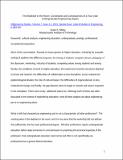| dc.contributor.author | Silbey, Susan S. | |
| dc.date.accessioned | 2016-08-26T13:24:55Z | |
| dc.date.available | 2016-08-26T13:24:55Z | |
| dc.date.issued | 2015-05 | |
| dc.date.submitted | 2015-02 | |
| dc.identifier.issn | 1937-8629 | |
| dc.identifier.issn | 1940-8374 | |
| dc.identifier.uri | http://hdl.handle.net/1721.1/104009 | |
| dc.description.abstract | Engineering is the only profession for which candidates can be licensed with only an undergraduate degree. This attracts students seeking training for occupation more than education, encourages heavy non-discretionary course requirements, and relegates engineering to lower status that other professions requiring training following an undergraduate liberal education. This focus on instrumental reasoning further isolates engineering from other more self-reflexive professions. | en_US |
| dc.language.iso | en_US | |
| dc.publisher | Taylor & Francis | en_US |
| dc.relation.isversionof | http://dx.doi.org/10.1080/19378629.2015.1062488 | en_US |
| dc.rights | Creative Commons Attribution-Noncommercial-Share Alike | en_US |
| dc.rights.uri | http://creativecommons.org/licenses/by-nc-sa/4.0/ | en_US |
| dc.source | Prof. Silbey | en_US |
| dc.title | The elephant in the room: constraints and consequences of a four-year undergraduate engineering degree | en_US |
| dc.type | Article | en_US |
| dc.identifier.citation | Silbey, Susan S. “The Elephant in the Room: Constraints and Consequences of a Four-Year Undergraduate Engineering Degree.” Engineering Studies 7, no. 2-3 (July 3, 2015): 164-167. | en_US |
| dc.contributor.department | Massachusetts Institute of Technology. Anthropology Program | en_US |
| dc.contributor.mitauthor | Silbey, Susan S. | en_US |
| dc.relation.journal | Engineering Studies | en_US |
| dc.eprint.version | Original manuscript | en_US |
| dc.type.uri | http://purl.org/eprint/type/JournalArticle | en_US |
| eprint.status | http://purl.org/eprint/status/NonPeerReviewed | en_US |
| dspace.embargo.terms | N | en_US |
| mit.license | OPEN_ACCESS_POLICY | en_US |
